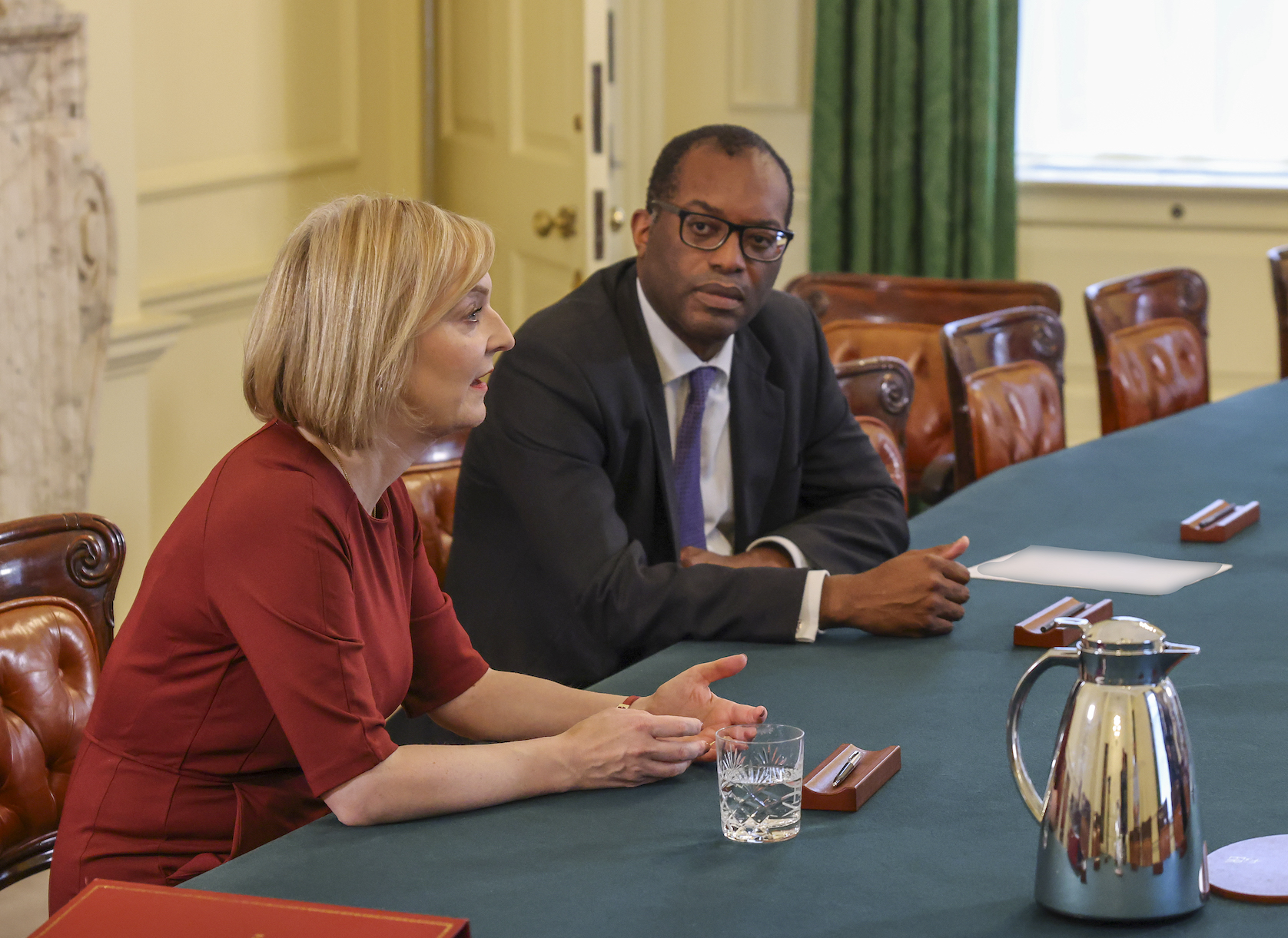Days after Liz Truss announced her resignation outside No 10, she reportedly told allies: “I lost a battle, but I haven’t lost the war”.
The Trussonomics conflict duly rolled on this week, with its lead foot soldier marching stateside — not for the first time — to advance the core tenets of her tax-cutting creed.
The former prime minister’s latest platform was provided by the Heritage Foundation, a synod for Americans with supply-side sensibilities, as part of its yearly “Margaret Thatcher Lecture”. It was far from a critical audience — in fact, in an oddly poetic sense, Trussonomics had come home. Having tried and failed to translate American-style tax-cutting politics onto British soil, this was the “mini budget’s” intellectual supremo preaching to her converters.
The Heritage Foundation hype man, given the unenviable task of introducing Truss, exalted the “British wit” and “good humour” of the “former prime minister”. The only allusion to the sheer brevity of Truss’ tenure was that her mission had come unstuck thanks to the “big tax, big government establishment in her country”.


It was a telling exchange. Back home, Truss is the face of debt-funded, rate-hiking fiscal-loosening — but in the US she can be restyled a martyr. It is a hagiographic spectacle disempowered Republicans will lap up for years to come.
So when Truss got to the stage, she played the hits. More texture was applied to her infamous “anti-growth coalition” tagline — her plans now faced “co-ordinated resistance” not only from her own party, the International Monetary Fund (IMF) and US president Joe Biden, but “wokery” too.
Then she rekindled her old rivalry with Emmanuel Macron. There was no further comment on whether he is “friend or foe”, although Truss did affirm that the French President’s recent trip to China had given a sense of “moral equivalence” between Washington and Beijing.
But far way from the tax-cutting firmament of the Heritage Foundation’s DC base, a rather more complex row was brewing: not with a foreign foe, but an old friend.
A Kami-Kwasi comeback?
The evening before the former PM’s speech, Kwasi Kwarteng had given an interview to GB News where he proffered a rather less confident appraisal of the rights and wrongs of the Trussite regime.
After the calamitous mini budget and a months-long soul-searching exercise, Truss’ former chancellor outlined that he was, in the end, “very pro-Rishi” — suggesting he would serve quite happily in his cabinet.
In stark contrast to Truss’ political pitch, which emphasises the opposition of Conservative MPs in league with “Treasury orthodoxy”, Kwarteng stressed the only difference that really mattered was that between the Conservative party and Labour’s “much more socialist” approach. Kwarteng then defended Jeremy Hunt, his successor, saying it was “odd” to see Truss attacking him given she appointed him to the role to steady the ship.
There was an intense ironic quality to the criticism. Back in October, Kwarteng first learnt he would be the UK’s shortest-serving chancellor while scrolling through Twitter, returned by request of Downing Street from an IMF get-together in Washington. Now it was Truss’ turn to be blindsided, mid-transatlantic haul.
But Kwarteng’s commentary may not have come as too great a surprise to the former PM: this was hardly the first time he had spoken damningly about his experience in Truss’ government.
In November, Kwarteng informed TalkTV that he had told Truss to “slow down” her radical economic reforms prior to mini budget day. He later told the Financial Times of his experience:
People got carried away, myself included. There was no tactical subtlety whatsoever. My biggest regret is we weren’t tactically astute and we were too impatient. There was a brief moment and the people in charge, myself included, blew it
An uncertain future for British libertarianism
In the 12-year-long build up to the mini budget, Kwarteng and Truss’ confidence in the intellectual case for low tax economics was unshakable and mutually reinforcing. But today, one market meltdown later, a fault line has emerged between the two. The co-authors of Britannia Unchained, the (in)famous 2012 treatise on the future of Conservatism, have themselves become disentangled.
Of course, there is no doubt that the “mini budget” continues to cast a long shadow over the tax-cutting cause. Its erstwhile supporters are confronted by a core problem: pursue ideological purity or seek some form of repentance. And that the two key authors in Kwarteng and Truss can’t decide on a shared strategy speaks volumes about the broader political difficulties faced by the Conservative party’s libertarian wing.
At some point, a new champion will step forward for the party’s tax-cutting movement. They will likely emerge from the “Conservative Growth Group”, the newly-cohered parliamentary caucus designed to provide Trussonomics with institutional longevity. But whoever flies the supply-side standard in a future Conservative leadership will have to answer some fundamental questions.
Do they shake or embrace the “Trussonomics” creed, lambasting “anti-growthers” and Conservative party opponents? Do they build on or disown the mini-budget’s vision? Crucially, should they enlist the support of Truss, or sideline her out of fear over her potential toxicity?
Back in Washington, Truss concluded her speech with a hint that she intends to remain in the political arena. “Last autumn, I had a major setback but I care too much to give up on this agenda. … Over the coming months, I’ll be setting out ideas about how we together can take this battle forward”.
She ended with a call to arms: “We need to fight this battle of ideas once again. Mrs Thatcher would have expected nothing less”.
Unfortunately for Truss, it’s not entirely clear her former chancellor and onetime closest confidant is on her side.












